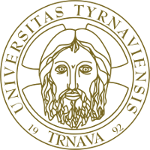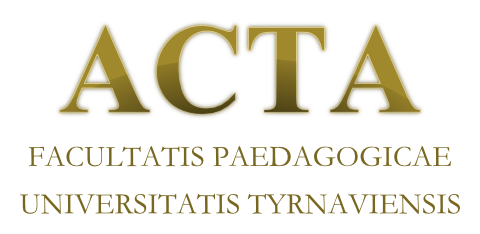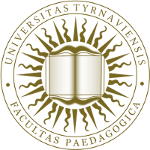 |
 |
 |
Zborník Pedagogickej fakulty Trnavskej univerzity
Séria C – Matematika, Fyzika, Informatika
Ročník 17
Trnava 2013
 |
 |
 |
Zborník Pedagogickej fakulty Trnavskej univerzity
Séria C – Matematika, Fyzika, Informatika
Ročník 17
Trnava 2013
Hlavný redaktor:
doc. RNDr. Pavel Híc, CSc.
Zostavovateľ:
doc. RNDr. Miroslava Ožvoldová, CSc.
Redakčná rada:
doc. RNDr. Miroslava Ožvoldová, CSc. (predseda)
prof. RNDr. Ján Čižmár, PhD.
prof. RNDr. Jozef Fulier, CSc.
prof. RNDr. Erika Mechlová, CSc.
doc. RNDr. Peter Čerňanský, CSc.
doc. Ing. Martin Mišút, CSc.
RNDr. Martin Malčík, Ph.D.
Ing. Kateřina Kostolányová, Ph.D.
Recenzenti:
prof. RNDr. Július Krempaský, DrSc.
prof. JUDr. Jozef Králik, CSc.
prof. RNDr. Juraj Slabeycius, CSc.
doc. RNDr. Daniela Hricišáková, CSc.
doc. RNDr. Miroslava Ožvoldová, CSc.
RNDr. Karol Kvetan, CSc.
|
Technický redaktor: |
Ing. Mgr. Roman Horváth, PhD. |
|
Obálka: |
Ing. Mgr. Roman Horváth, PhD. |
|
Vydala: |
Trnavská univerzita, Pedagogická fakulta ISBN 978-80-8082-756-4 |
Kontakt na redakciu:
Pedagogická fakulta TU
doc. RNDr. Miroslava Ožvoldová, CSc.
Priemyselná 4, P. O. Box 9
918 43 Trnava, SR
|
Fyzika |
|
|
Žaneta Gerhátová, Miroslava Ožvoldová: Energia v prírode, technike a spoločnosti |
1 |
|
Žaneta Gerhátová: Bádateľský prístup v jednoduchých experimentálnych úlohách |
91 |
|
Daniela Hrcišáková: A Remark to Readiness of Students in Domain of Mathematics Literacy at the University Study |
98 |
|
Karol Kvetan, Helena Hološová: Riadenie fyzikálneho merania pomocou lokálneho počítača s použitím internetového školského experimentálneho systému – ISES |
102 |
|
Magdalena Tomanová: Zlatý rez a numerická optimalizácia |
112 |
|
Eva Ivanová: Použitie matematického aparátu v ekonómii |
119 |
Trnavská univerzita v Trnave, Pedagogická fakulta, Katedra fyziky
Priemyselná 4, P. O. Box 9, 918 43 Trnava, SR
Univerzita Tomaše Bati ve Zlíně, Fakulta aplikované informatiky, Ústav matematiky
Nad Stráněmi 4511, 760 05 Zlín, CZ
Abstract: Energia v prírode, technike a spoločnosti. The major contribution of the paper is the proposal, preparation and implementation of a non-traditional form of education using ICT in a primary school unit “Energy in the nature, technology and society”, as well as the analysis of the research implementation. The submitted and piloted project education proved that it supported the integration of aims in the subject of Physics – Information Technologies – Technical training. The implemented INTe-L strategy consisted of three components: 1. real and real remote experiment via the Internet, 2. e-simulations and interactive applets, 3. e-learning material. To achieve the above mentioned results, we divided the project into six partial projects. Subsequently, assignments for individual partial projects were designed, while implementing all INTe-L components. To get relevant feedback, pre-test, post-test and continuous didactic test, as well as questionnaire and interview were developed.
The objective of the survey carried out prior to the research was to verify the possibilities of utilising the strategy of integrated e-learning in project education, to detect possible pitfalls and to tests whether the research tools work properly.
Prior to the experiment, we used a questionnaire to identify the opinions of pupils regarding: a) traditional way of teaching the subjects of Physics in primary schools; b) utilising experiments in teaching the subjects of Physics in primary schools; c) utilising ICT in teaching the subjects of Physics in primary schools; d) project education in primary schools. To verify the hypothesis, we carried out a pedagogical experiment on a sample of 155 respondents. The results attained in the experimental group (EG) were statistically processed, evaluated and subsequently compared with those in comparative one (CG).
The statistical analysis was carried out by means of the methods from the Data Analysis menu of Microsoft Office Excel 2003 program. A two-phase test with dispersion equality proved that:
a) the differences in the pre-test of the 9th grade pupils of a rural school (primary school A) on one hand, and a city school (primary school B) on the other hand, were not statistically relevant;
b) the differences in the pre-test between EG and CG were not statistically relevant;
c) the differences in all continuous didactic tests (6 in total) between EG and CG were statistically relevant, i.e. there is statistical dependency;
d) the differences in final didactic test (post-test) between EG and CG were statistically relevant, i.e. there is statistical dependency.
Analysis and evaluation of the results attained by the pupils proved the effectiveness of project education with INTe-L support and justified its implementation into the education process in primary schools.
Keywords: energy, integrated e-learning, pedagogical research, Physics, project based education
Katedra fyziky, Pedagogická fakulta, Trnavská univerzita
Priemyselná 4, P. O. Box 9, 918 43 Trnava, SR
Abstract: Inquiry Approach in Simple Experimental Tasks. The paper presents the topic of the worksheet “What kind of water freeze early, warm or cold?” We have created the worksheet for guided inquiry. This is the one of the activities in hierarchies of pedagogical practices of inquiry processes written by S. Wenning. It was adapted by project’s participant ESTABLISH (European Science and Technology in Action: Building Links with Industry, Schools and Home), focused on Inquiry-based science education (IBSE). The guided inquiry lab is characterized by identifying the problem and multiple leading questions that point the way to procedures. The process is managed by teacher. From the student perspective the guided inquiry lab is characterized by acquiring new knowledge. Students bide instructions in worksheet step-by-step, and they test their predictions.
Keywords: experiment, Inquiry-based science education, guided inquiry lab, water
Fakulta sociálno-ekonomických vzťahov, Trenčianska univerzita Alexandra Dubčeka
Študentská 2, 911 50 Trenčín, SR
Abstract: A Remark to Readiness of Students in Domain of Mathematics Literacy at the University Study. A level of mathematics knowledge at average graduates of the grammar (secondary) schools and applicants to economical and technical faculties is at the historical minimum. The extemporaneousness of candidates to the study itself is on the other hand at the historical maximum. Important is the fundamental alone, with which the students of grammar (secondary) schools flow into universities. We can observe here a long-time retrogressive level of the mathematical preparation at secondary schools.
Keywords: Literacy, student, survey, diagram, mathematics
Ústav materiálov, Slovenská technická univerzita v Bratislave
Materiálovotechnologická fakulta so sídlom v Trnave
Paulínska 16, 917 24 Trnava
Abstract: The Control of Physical Experiment by Means of Local Computer with Using of the Internet School Experimental System – ISES. The paper presents the first step to the building of a distant experiment, in the framework of remove physical laboratory directed via internet. It deals with the measurements of the basic characteristics of electrical voltage source. The individual parts of arrangement were realized by the ISES-kit, that is capable to command the measuring procedures and to transform the corresponding values via computer.
Keywords: Physical experiment, electrical source, electromotive force, applied voltage, internal resistance, ISES-kit
Fakulta sociálno-ekonomických vzťahov
TnUNI Alexandra Dubčeka v Trenčíne
Študentská 2, Trenčín
Abstract: Golden Ratio and Numerical Optimization. The Irrational number Golden ratio is an important mathematical constant. It can be found and it is used in various areas. Until recently the use of Golden ratio has been limited mainly to areas of art and architecture. Today a use has also been found in economics, especially in numerical optimization. This article describes the principle of finding a minimum of unimodal function using Golden ratio.
Keywords: Golden ratio. One-dimensional optimization. Numerical optimization. Unimodal function.
Katedra ekonómie a ekonomiky
FSEV TnUAD v Trenčíne
Študentská 1, 911 50 Trenčín
Abstract: Using mathematical tools in economics. Mathematics plays an important role in the economy, a compact means of expression with which to vividly convey the essence of economic phenomena, but also the processes taking place at a certain time. Therefore economics in its analytical tools used strictly mathematics. If we want the economy to explain the causes, nature and consequences of economic decision-making entities in the model approach. Model captures the essential features of the analyzed system for simplified assumptions under “ceteris – paribus”. The application of the model approach for the analysis of microeconomic problems carries a high degree of abstraction. Economic model can be formulated verbally, graphically or algebraically. Graphic views allow you to easily understand the relationships between economic variables variables. The graph shows the numerical information interpreted in visual form. The following article shows a graphic and analytical formulation of the problem of the economic impact of government decisions on market equilibrium.
Keywords: mathematics, economics, state regulation, market equilibrium